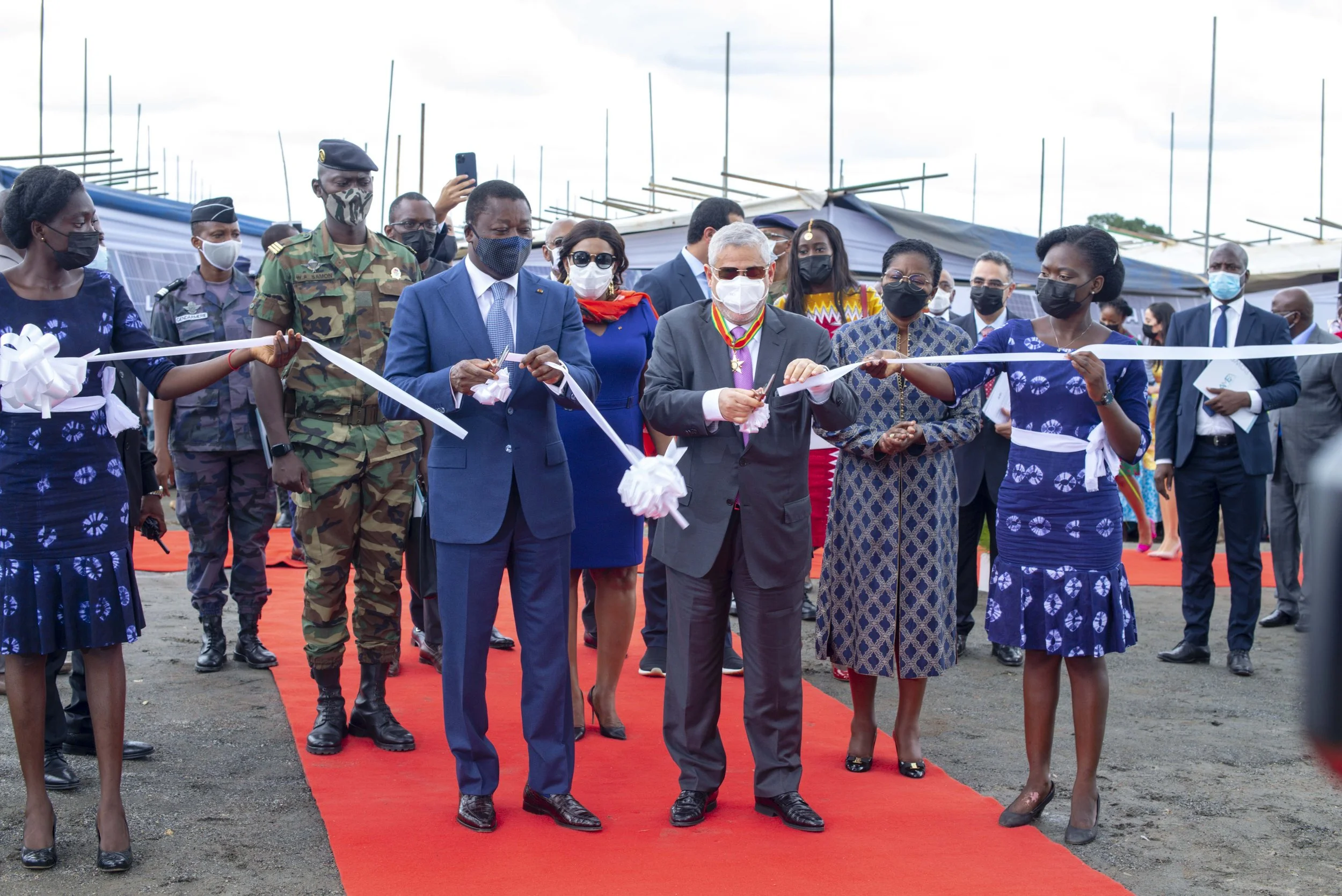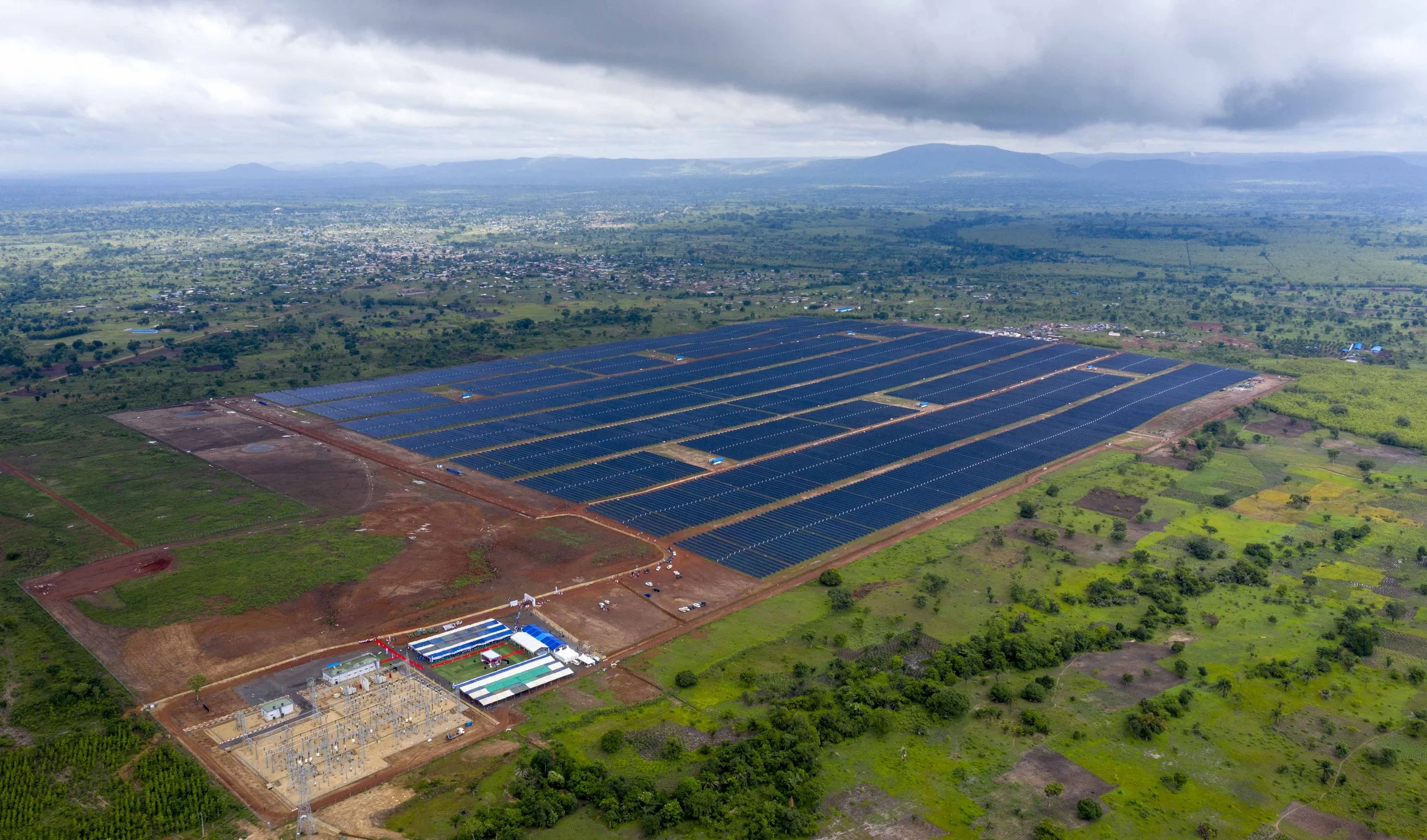Why the UAE is a Perfect Partner in Africa's Green Energy Revolution
Hussain Al Nowais, Chairman, AMEA Power, Faure Gnassingbé, President of Togo and Togolese Ministers at the ribbon cutting ceremony for the 50MW solar project in Togo.
By Hussain Al Nowais, Chairman, AMEA Power
Hussain Al Nowais, Chairman of AMEA Power, underlines the importance of alternative funding sources in backing the COP28 Presidency's push for expanded climate finance, vital for advancing Africa's energy transition and climate mitigation efforts.
In November, as the world gathers for COP28 in Dubai, climate finance for low-income countries will take centre stage once more.
The COP28 Presidency has highlighted the urgency of increasing climate finance to enable Africa combat the severe effects of climate change and align its development path with the critical goal of limiting global warming to 1.5°C.
Climate change has triggered widespread food insecurity, affecting over 800 million people. The African Development Bank (AfDB) estimates that climate-related losses and damages range from $289.2 billion to $440.5 billion, including food security, water supply, disease control, and biodiversity preservation.
Energy and climate change are intricately linked, presenting an opportunity for sustainable, low-carbon energy solutions to play a vital role in addressing these challenges.
Currently, Africa is faced with major challenges in accessing energy services, with only a 31% access rate to electricity, leaving more than 600 million people on the continent without access. This is even worse in rural areas.
Traditional biomass still accounts for 85% of primary energy supply and 80% of energy consumption. This reliance on inefficient energy sources, coupled with inadequate capacity and governance, threatens energy security across the continent.
The COP28 presidency has prominently highlighted the potential of renewable energy adoption to mitigate climate change while enhancing energy access in Africa. Unlike fossil fuels, renewable technologies such as wind and solar offer a zero-carbon footprint.
With the potential to become a global hub for renewables, Africa offers a path to sustainable, green growth. However, a significant obstacle hinders progress: the lack of accessible and affordable finance.
A joint working group, forged at last month’s Africa Climate Summit in Nairobi and led by the COP28 Presidency, is driving efforts to facilitate a just energy transition and accelerate climate finance in Africa. Dr. Sultan Al Jaber, the COP28 President-Designate is leading this effort and helping to advocate for Africa's role in clean growth.
Currently, clean energy investment in Africa represents just 2% of the global total, falling significantly short of the $120 billion annual requirement.
Blitta, Togo, 50MW Solar PV plant
The COP28 presidency further highlights the need to fulfil developed nations' historic commitment of $100 billion annually in climate finance to support developing countries.
Leading multilateral development banks like the World Bank, European Investment Bank, and African Development Bank are increasing their investments in renewable energy and sustainable finance projects in Africa. However, these efforts must be significantly scaled up to address the continent's needs.
According to the Climate Policy Initiative (CPI), Africa requires $277 billion annually to meet its 2030 climate goals, yet it currently receives only $30 billion in climate finance per year.
This is where the UAE comes into play as a valuable partner for Africa. The UAE, with its advanced technological know-how, extensive experience in renewable energy development, and robust financial capability, can serve as a catalyst for Africa's green energy revolution.
Through finance, and by sharing expertise in project development and technological innovation, the UAE can help African nations unlock their renewable energy potential.
Through a $4.5 billion capital commitment unveiled at the Africa Climate Summit in Nairobi last month, the UAE seeks to fast-track the expansion of renewable energy development in Africa, targeting a capacity of up to 15 gigawatts (GW) by 2030.
This financial initiative represents an unprecedented collaboration between public, private, and development sectors. It is driven by a consortium of UAE institutions including the Abu Dhabi Fund for Development (ADFD), Etihad Credit Insurance (ECI), Masdar, and AMEA Power, with Africa50 poised to join as a strategic partner.
The UAE’s investment initiative is part of Etihad 7 unveiled during Abu Dhabi Sustainability Week 2022 by the UAE Ministry of Foreign Affairs and seeks to deliver clean electricity to 100 million people in Africa by 2035.
The UAE's own rapid ascent to economic prominence, despite its relatively modest size, serves as an exemplary narrative that many African nations might want to emulate. By almost every major index, including the World Economic Forum Competitiveness Index, the UAE stands at or near the top of its region.
Hence, it comes as no surprise that the UAE, which hosts COP28, has emerged as a regional leader in solar energy, with an astounding 10 GW of solar capacity under construction, firmly positioning it as the GCC region's solar energy hub. Currently Dubai generates 15% of its electricity from solar.
Bolstering this commitment, the UAE has ambitiously revised its energy strategy, with plans to triple renewable energy capacity to 14 GW by 2030, up from the current 3.2 GW with a $54 billion investment.
According to the International Renewable Energy Agency (IRENA), Africa requires more than $120 billion in financing by 2030 to supercharge its renewable energy development.
The UAE has the financial muscle to facilitate investments in Africa's renewable energy sector, attracting international investors and lending institutions to support these projects.
However, Africa needs more than just financial investment; it requires unwavering commitment, expertise, and effective policies to realise a robust renewable energy agenda. This is precisely what the UAE-headquartered AMEA Power, the only private entity in the UAE finance initiative, has been doing in Africa since 2015.
AMEA Power was one of the first few UAE based company that saw opportunity in Africa’s renewable energy market at a time when the appetite for investment in the sector was very low.
But our commitment and dedication over the years, in the face of insurmountable challenges, have paid off, making AMEA Power one of the leading and most reliable renewable energy investors in Africa.
Today, AMEA Power is actively engaged in 19 African countries with over 1,600MW of clean energy projects either in operation or under/near construction across Burkina Faso, Djibouti, Egypt, Jordan, Morocco, South Africa, Togo, Tunisia, and Uganda. These projects alone will contribute in reducing CO2 by more than 3,150,000 tonnes per year.
As AMEA Power, we are targeting 5GW of fully operational renewable energy capacity on the African continent by 2030. To realise this target, we are mobilising US$5 billion, with US$1 billion as equity commitment and US$4 billion through project finance.
Our ongoing 500MW PV solar and 500MW wind projects in Egypt, with a US $1.1 billion financial close secured late last year, are a major highlight of our commitment to advancing renewable energy.
In the days immediately following the Africa Climate Summit and in keeping up with clean energy commitments made in Nairobi, AMEA Power signed a Power Purchase Agreement (PPA) with the Government of Uganda for a 25 MWp solar plant in the West Nile Region. This is AMEA Power’s first solar PV project in East Africa which sets the stage for ambitious expansion plans into the wind and battery energy storage sector in Uganda and the East African Community region at large.
In the next few weeks, AMEA Power will inaugurate West Africa's largest solar PV project, expanding our 50MW solar PV plant in Togo to 70MW, and introducing battery storage—a significant step towards our climate change mitigation objectives.
Indeed, in recent years we have witnessed a steady rise in demand for dependable energy storage solutions as the share of electricity generated from renewable energy increases in Africa,
This demand arises out of the need to enhance grid resilience and flexibility, with battery energy storage seen as an essential balancing asset. AMEA Power recently put forward a bid for one of Africa’s largest Battery Energy Storage System (BESS) tender taking place in South Africa. Everyone is excited to see the results and outcome of this process, which ESKOM will be the off-taker.
At the same time, we are witnessing great potential for green hydrogen in Africa, and this is going to be a key focus for AMEA Power going forward. We have just concluded detailed feasibility studies on the 1GW green hydrogen electrolyzer project in Egypt’s Suez Canal Economic Zone.
Africa has great potential to develop large-scale green hydrogen projects given the continent’s significant renewable energy potential and proximity to demand markets, primarily Europe and Asia. Countries such as Mauritania, Namibia and Morocco are already undertaking major green hydrogen projects as a total electrolyzer pipeline of 114 GW is announced for the continent, 61% of which (70 GW) earmarked for the sub-Saharan African region.
The UAE’s National Hydrogen Strategy, which aims to position the UAE as a frontrunner in hydrogen development, targets a production of 1.4 million tonnes per annum of low-emission hydrogen by 2031, with 71.4% being green hydrogen.
By 2050, the UAE aims to scale up production tenfold, reaching 15 million tonnes per annum. The success of this strategy offers valuable lessons for Africa’s nascent green hydrogen industry. Last week's unveiling of Kenya’s green hydrogen strategy and roadmap opens up exciting opportunities for collaboration with the UAE.
Of equal importance is the immense potential for electric grid interconnectivity between Africa and the UAE. This can facilitate the transmission of renewable energy from Africa to the UAE and beyond, contributing to global efforts to reduce greenhouse gas emissions.
AMEA Power’s engagements in Africa are already having a direct economic and social impact on host communities. Reflecting our own values as a company, our Community Investment and Development program supports various educational, health, environmental and social initiatives, as well as local infrastructure development.
Ahead of COP28 in November 2023, AMEA Power aligns with the UAE Presidency's visionary climate action approach. Our efforts extend to empowering host communities through economic, social, and environmental initiatives, reflecting the company's values and commitment to positive change in Africa.
We also believe that innovations, such as blended finance (concessional funding with commercial financing) can help in addressing Africa’s renewable energy needs. Through this model, AMEA Power was recently able to reach financial close on its 120MW solar PV project in Tunisia with $86 million funding from the International Financial Corporation (IFC) and AfDB.
Africa's clean energy potential is vast, but realising it demands political will, visionary ambition, and substantial capital.
We firmly believe that fostering strategic partnerships to expedite sustainable infrastructure projects in Africa is key. It will significantly enhance our ongoing efforts toward a substantial energy transition that will ultimately uplift the socio-economic well-being of local communities. This commitment will prominently feature in our participation at COP28 in November.
Hussain Al Nowais, Chairman of AMEA Power, underlines the importance of alternative funding sources in backing the COP28 Presidency's push for expanded climate finance, vital for advancing Africa's energy transition and climate mitigation efforts.


